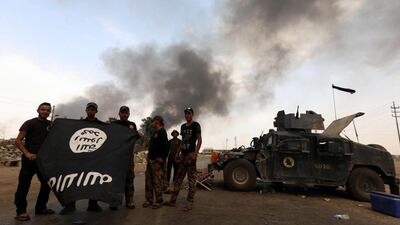There is no doubt that ISIL will be defeated soon. Yet the extremist ideology it propagates throughout the region will persist if we do not address its root causes.
The US military stated this week that it anticipates Mosul will be liberated by the end of the year. Arguably though, the real battle to defeat ISIL will only become more complicated when Iraq’s second largest city is freed.
Mosul was seized in June 2014. Since then, it has been a hotbed for ISIL that has helped the organisation spread its tentacles across the region and the world.
Shortly before ISIL took control of the city, public polls showed that 85 per cent of people living in Mosul believed that their country was heading in the wrong direction, while 75 per cent stated that human rights were not respected.
Two-thirds believed that government institutions interfered in their private lives and 83 per cent of households said that they felt unsafe in their neighbourhoods.
Most alarming of all is that a week after ISIL occupied Mosul, 81 per cent of the city's households stated that they now felt safe.
In short, people in Mosul despised the Shia-led government and their militias who committed atrocities. But if the same politicians come back to run Mosul after it is liberated, anger and resentment will spread and will provide the conditions for terrorism to flourish.
To prevent this, we need to address their concerns and avoid the mistakes of the past.
This entails adopting a strategy to empower Mosul’s people by giving them more authority over their lives. We also need to take a different tack to the one that some local politicians are suggesting. These politicians, who are part of the problem, have been promoting federalism as the right solution for Iraq. Unfortunately, this is also what some US officials advocate.
But in the current political environment, federalism and the power that lies with the political elite will increase tensions with the Iraqi government and will increase Turkish influence in the region. A Sunni, Shiite and Kurdish power struggle will potentially take place. Again, this is the right environment for ISIL and similar organisations to flourish.
The suggested approach will not only take care of Sunni, Shiite and Kurdish concerns, but it will also address the worries of Christian, Yazidi and Shabek, marginalised groups who will be fairly represented under free and fair elections.
A strategy of empowering people needs to be implemented by trusted players who represent the people of Mosul and not the same political elites who were imposed by foreign forces, whether it was the US, Turkey, Iran or any other regional or international player.
This cannot be reached unless there are impartial and independent local authorities that can establish the right and healthy environment for free and fair elections. The current politicians will never provide such conditions.
All interested parties should agree on an interim local government of technocrats with no more than a two-year mandate. All members of this government should commit not to run in the next round of elections.
The interim government’s should work with the federal and international agencies to develop a sustainable local economy.
Finally, if we really want to avoid further outbreaks of terrorism in the region, it is very important to prevent Turkey, Iran and the Kurdish regional government or their agents from being given a free hand in the future of Mosul.
Munqith Al Dagher is the founder and president of IIACSS, a social research and marketing firm in Iraq

